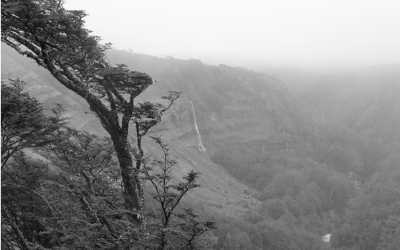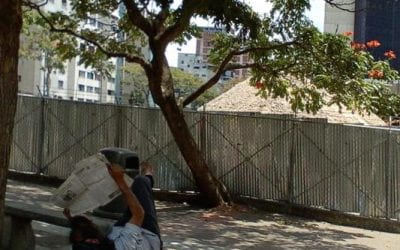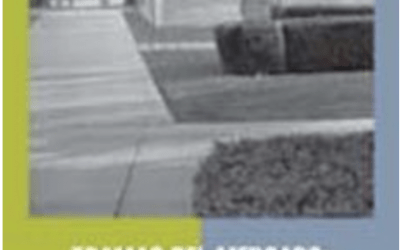Chávez’s Venezuela
A New Magical State?
What do you think of Hugo Chávez? Are you for or against him? Venezuelans inevitably confront these questions when we travel or meet people unfamiliar with our ideas. Unless one stands at one of the two opposite poles dominating political life in Venezuela during this last decade, it is hard to answer them. A generalized Manichean mind-set tends to push and flatten every position towards the extreme ends and nuanced views are often dismissed or cast aside as camouflaged versions of either pole. Can this issue of ReVista escape from this tendentious debate? Can it help readers explore these questions?
Historical ruptures often divide people and polarize political discourse. Ever since Chávez was elected in 1998 by 56% of the vote, an already polarized society has become even more painfully divided as Chávez has not only talked revolution but has unleashed it from the commanding heights of an increasingly oil-rich petro-state. A product of a fractured nation, Chávez has built on the growing chasm between rich and poor and given it historical and moral significance.
From his initial appearance as a rebel officer until now, Chávez has proclaimed the need to regenerate Venezuelan society, but guided by different principles and through different means. As president, Chávez initially focused on changing the political system’s formal institutions; his major accomplishment at the outset was the formulation of a new constitution, approved by general elections in December 1999. Since then, we have seen a rather rapid replacement of ruling sectors and of the parties that represent them, an expansion of social programs, a progressive move towards instituting what he called in 2005 “socialism of the 21st century,” and uneven steps towards expanding the role of the state in the economy and society—some taken even after the defeat of his constitutional reform in 2007, his first electoral loss. The impetus to create a more ethical society, however, has not changed. During his rule, “the people” (el pueblo) have become widely recognized as the sovereign—el soberano.
Even if much would have to happen to turn this principle into reality, in my view this is a formidable accomplishment. Now it is impossible to participate in politics in Venezuela without recognizing the centrality of common people. Even conservative leaders whose familiarity with ordinary Venezuelans is restricted to their servants, now proclaim—have to claim—that they struggle for el pueblo. The cover of ReVista captures the sense of pride, dignity and defiance that Chávez has generated among the popular sectors in Venezuela.
Ironically, this democratic ideal does not break from, but reactivates, a founding principle of the IV Republic, the previous political system that Chávez now so vehemently rejects. In Venezuelan politics, el pueblo came to occupy center stage when the party Acción Democrática (AD)—“el partido del pueblo”—fought for power and conquered the state, first through a successful coup d’état in 1945 against the liberalizing regime of General Isaías Medina Angarita, and later through universal elections in 1947 (the first in Venezuelan history), which legitimated the party’s rule, helping to erase its violent origins. But as time passed and new and old elites colluded and shared the spoils of power, this main actor, personified asJuan Bimba, an emblematic figure of the common man that has also slowly vanished from the public imaginary, slowly became a rhetorical ornament rather than the main protagonist of democracy.
Indeed, after almost half a century of democratic rule in its name, el pueblo—as the impoverished majority—was pushed to the margins or even violently discarded. Declining economic conditions, particularly in the 1980s and 1990s, made it difficult to continue to use oil money to lubricate social tensions and cushion class conflict. The “Caracazo,” the massacre of four hundred Venezuelans in 1989 during protests against the imposition of International Monetary Fund (IMF) measures at a time of increasing economic hardship but rising political expectations, is an emblematic moment of this political betrayal.
Treating it as a popular rebellion, Chávez has transformed the Caracazo into a founding threshold of the Bolivarian revolution. As if following the script of the great social revolutions of the modern period, Chávez is re-writing the nation’s history through his prolific verbal production—as far as I know, he speaks publicly more than any national leader ever anywhere. Yet his words, perhaps because of their exuberant proliferation, serve not to just to reconstruct past history or to guide its new construction, but to substitute for it. As they conjure up a world of their own, at times it is not clear whether one is living through a real or a rhetorical revolution, perceiving the initial flowering of human capacities in a freer society or the manicuring of a bonsai revolution, having a dream or a nightmare, or awakening to recognize history as both.
To his credit, through words that are also acts and guide actions, Chávez has brought the pueblo to center stage again, first through his failed 1992 coup in 1992 that turned him overnight into their avenging champion, and then through several elections (particularly in 1998, when he became president, and in 2006, when he was reelected), which legitimated his leadership as the chosen commander of the revolución. While he is in fact its absolute leader, his self-fashioning as its humble soldier and his celebration of “participatory democracy” has opened significant spaces for popular mobilizations in the name of the revolución. Revolution now rules.
Since AD’s October 1945 coup—which it hyperbolically baptized as “la Revolución de Octubre”—successive regimes have legitimated their rule by claiming to be enacting a revolution on behalf of the people. After 1945, when a displacement of ruling sectors took place, the entrenched elites arrogantly sought to contain AD leaders and their “barbarous” masses. Once again, after Chávez was elected in 1998, after he proved not to be a malleable pawn, the established elite has sought to maintain power through a variety of means, from coups, to alliances, to elections. The Chávez revolution is being defined as it is made; it certainly has not been the chronicle of a death foretold. Is history now repeating itself—whether as tragedy or farce—or, is it unfolding as a true revolution?
It has been said that asked what he thought of the French revolution, Chou En Lai answered: “It’s too early to tell.” Perhaps we should take his answer not just as diplomatic or witty, but as a reminder that it takes time to discern the significance of historical events. While from either extreme the answer will seem evidently obvious, in this case I think it is too early to tell. Uncertainty about Venezuela’s future is magnified by the fractures of the present. The shared rules of Venezuela’s long-standing democracy are no longer in play. Unmoored from them, the proliferation of formulaic scripts, inflated hopes, political fears, and moral panics has subjected politics to what I call, for lack of a better term, “the rule of the stereotype.”
Under the rule of the stereotype, the mutual demonization and erosion of shared sociality has saturated not just the public sphere but the private domains of family and friendships. It is as if a storm of clashing slogans had suddenly fallen upon Venezuela and split it into two. Divided by verbal fences, Chavistas and anti-Chavistas inhabit mutually hostile social worlds. Enclosed by barbed words, each world treats its reasons as Reason itself and adversaries become enemies. The ground of reasonable discussion vanishes. It is telling that the exacerbation of disputes among relatives and of divorces among couples has brought into being a code of conduct common during social crises but unfamiliar in the olden Venezuela charmed by the illusion of harmony: No politics allowed at home. Ironically, while the country has been heavily politicized, in many social gatherings of kin and friends politics has become a taboo subject.
Rather than evading it, this special issue of ReVista faces politics heads on. By presenting a plural set of informative reflections on Chávez’s Venezuela, we seek not only to illuminate the nation’s changing political and cultural landscape, but to stimulate a sensible dialogue among those interested in Venezuela—hopefully with Venezuela’s interests in mind. Needless to say, we have no intention of settling questions, but of exploring them. Any of the issues discussed here could be further examined from other perspectives.
On Venezuela’s revolutionary stage, principles and interests have been performing their usual play, leading to the common marriage of conviction and convenience, but with unusual versatility and unexpected offspring. In the daily unfolding of this drama, one may be impressed by the emergence of principled political activism—as when barrio dwellers get organized on their own despite political differences or students speak up on behalf of the nation with a renewed sense of dignity. Or, one may be shocked by rather uncommon instances of common political opportunism—as when once independent leaders obediently repeat slogans and smile on cue or iconic archenemies negotiate in secret the spoils of power. Just as one becomes hopeful when one sees high ideals widely proclaimed, one loses faith when one sees them pervasively subverted.
No matter where one stands or how one views Chávez’s Venezuela, few would dispute that under Chávez the nation is different. But as soon we try to specify how different is this Bolivarian Venezuela, we run into sharp disagreements. Depending on your perspective, this historical drama may appear as a revolution or as a masquerade—or if you include the backstage, as a murky mixture of both. Some see Venezuela’s future as bright; others see only blight. Let’s take a quick look at Venezuela from its extremes.
From one pole we would see: a democratic state at the service of a people that is participating in ever new ways in national and local politics, a healthier, more educated and better fed population, an oil industry under national control, oil money invested into both the people and a diversified economy, as well as a sovereign international policy.
From the other pole: a militaristic autocratic state, a new corrupt elite, a state increasingly in control of the economy, education and culture, growing scarcity of basic goods and declining public services, a port economy ever more dependent on oil rents, and an international policy at the service of partisan interests.
Clearly, these are mirror images of each other. By outlining them as caricatures, my intent is not to dismiss compelling views that may well be sighted from either end, and even less to find an antiseptic or wishy-washy middle-ground, but to counter flat distortions that block understanding and stand in the way of efforts, from both sides, to deepen democracy.
While it is true that in order to understand Venezuela it is necessary to understand Chávez, it is even truer that in order to understand Chávez we must understand Venezuela. Clearly, this reciprocal understanding could be pursued through multiple approaches. I am not alone in believing that the concept of the magical state provides a useful frame for this purpose. As is often the case with brilliant insights, this idea, originally suggested by Venezuelan playwright José Ignacio Cabrujas, is rather simple: oil wealth is the key to understand the specific character of the state in Venezuela, including the appearance of presidents who embody collective powers as their own and act as magnanimous sorcerers who can bring out fantastic realities out of a hat.
Through historical analysis and theoretical elaboration, I have developed in other writings the notion of the magical state as a frame to examine multiple aspects of Venezuelan historical formation and political culture—not just the emergence of powerful leaders, but the formation of a society dependent on the state and enchanted by its spectacular performances. Since this concept has gained wide acceptance, it is not surprising that many analysts, including several authors of this issue of ReVista, have used it to discuss the Chávez state.
Yet in the polarized Venezuelan context, neither pole is fond of this framework, perhaps not because it doesn’t work, but because it works too well. For those bent on blaming Chavez in the name of Venezuela’s democratic traditions, this model makes it difficult to forget that previous presidents also concentrated power in the state and used it to promote partisan ideologies, group privileges, and personal interests. For those bent on inaugurating a new epoch, the concept suggests not just historical continuities, but the repetition of vices denounced by Chávez, including presidentialism, corruption, and grandiose promises.
While I agree it is a useful model, I think the Chávez state is a different type of magical state. To make this frame more useful, just as for previous regimes, it must be historicized carefully. At the risk of blurring continuities or exaggerating ruptures, I will draw with broad strokes three of its contrasting features.
- From the goal of development to the ideal of welfare. As if playing variations of the same theme, from the outset of Juan Vicente Gómez’s rule in 1908 to the end of Rafael Caldera’s presidency in 1998, the state sought to achieve the elusive goal of modernity by promoting economic development through the expansion of agricultural and industrial production. As if listening to a different drummer and playing a different melody, the Chávez regime has sought a different modernity by rejecting capitalism within a class-divided society and promoting collective welfare through social solidarity within a yet to be defined socialist society of the 21st century.
- From the illusion of unity to the ideal of justice. Previous regimes proclaimed as their ideal the creation of an inclusive national community, minimizing internal differences and emphasizing common values. An offspring of internal fractures, the Chávez regime has built on them in order to create an exclusive national community, maximizing its difference from internal and external enemies identified by their privileged status and flawed morality, and emphasizing its values of solidarity and altruism in contrast to their greed and selfishness.
- From political devotion to devotion as politics. The leaders of magical states appear as powerful individuals by incarnating as their own powers that actually belong to the collectivity. Their extraordinary performances—although different in form and content—demand the political devotion of their subjects. Chávez offers not just modernity, but another history, and presents himself as both its prophet and its maker. Given his exalted state as the nation’s savior, his rule mandates that his subjects be not just devoted to his politics, but make devotion into a form of politics.
These three features add to a particular modality of the magical state: a charismatic state. As Max Weber argued, charismatic forms of authority arise in response to social crises that typically produce messianic leaders who promise salvation to populations wounded by history and undergoing economic and moral hardship. Unlike states formed in Venezuela during periods of economic growth, the Chávez state is the product of an economic and social crisis, even if it has been sustained by expanding oil revenues. In my view, this combination of crisis and abundant resources has sustained Chávez’s messianic relationship to history.
Two phrases capture this relationship: “Por ahora” (for now), pronounced when he recognized his defeat as leader of the February coup of 1992, and “Hasta siempre” (forever), written when he was jailed and feared for his life during the 2002 coup against him. Even in defeat, in both occasions Chávez acted as the prophet of his eventual return as the redeemer of a wounded nation.
Historians will debate forever the role of exceptional individuals in history. In Latin America, their legacy is at best ambiguous, as they have often contributed to the expansion of democracy, but also to the establishment of entrenched hierarchies. Those of us interested in deepening democracy demand that leaders promote conditions that make their leadership unnecessary. For me, the greatest success of the Chávez regime has been to establish the principle that the pueblois soberano. Let’s hope that the proceso (the process), as many activists in Venezuela plainly call the current struggle to deepen democracy, will unfold in such ways that the people will make themselves into the soberano, in reality, hasta siempre.
Fall 2008, Volume VIII, Number 1
Fernando Coronil is Presidential Professor at The Graduate Center, City University of New York, and Emeritus Professor, Department of Anthropology and Department of History at the University of Michigan. This introduction is dedicated to the memory of Yolanda Salas, whose thoughts are present here.
Related Articles
Editor’s Letter: Venezuela
Long, long ago before I ever saw the skyscrapers of Caracas, long before I ever fished for cachama in Barinas with Pedro and Aída, long before I ever dreamed of ReVista, let alone an issue on Venezuela, I heard a song.
Elections and Political Power: Challenges for the Opposition
English + Español
Next month’s elections will be an important benchmark in Venezuelan politics. On November 23, voters will go to the polls to elect 22 state governors and 355 mayors in as many municipalities, as well as choose the mayor of Caracas. The elections are taking place in a political environment influenced by the abrupt proclamation of 26 laws on July 31, the last day of President Chávez’s 18-month powers to issue emergency decrees …
A Review of Tramas del mercado: imaginación económica, cultura pública y literatura en el Chile de fines del siglo veinte
Luis Cárcamo-Huechante’s new book provides us with a convincing counter-narrative, at once nuanced and succinct, to three mainstream narratives of the neoliberal free market in Chile: those of monetarist economics, promotional politics, and literary bestsellers. It covers the Pinochet dictatorship (1973-90) and the transition to democracy from its official inauguration in 1988, with the victory of the Yes vote for a return in two years’…




